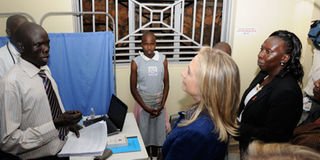Pioneer recipient of ARVs under Pepfar soldiers on eight years after kissing death

Mr Engole (L) speaks to US secretary of State Hillary Clinton (2nd R) in Mbuya, a Kampala suburb, on Friday. PHOTO BY TABU BUTAGIRA
What you need to know:
Lucky. Fired by the employer and deserted by his wife when ill, Mr Engole, the first person in the world to receive treatment under US-funded PEPFAR programme, has regained his health and productivity as well as a new job.
He sat on a plastic chair, legs outstretched. Facing John Robert Engole, and dressed in school uniforms, were his two teenage daughters. And a doctor in a white laboratory coat planted himself on a stool, leaning backward in the same 3-section cubicle contrived with hospital curtains in this storey structure.
Mr Engole, 43, is an idolised man-at least for his pluck. Last Friday and at the headquarters of Reach Out Mbuya HIV/Aids Initiative, a faith-based organisation, he was a locus of animated confab.
Ms Hillary Clinton, the US secretary of State, was minutes away arriving in a crawling convoy to this hilly and leafy Kampala suburb. The mood was uptight. And soldiers from the Uganda’s elite Special Forces Group (SFG) frisked every visitor after ushering them through a metal detector.
Inside the quadrangle, two members of the Secretary’s security detail clad in black suits paced up and down, scanning for the minutest happening around the podium where Ms Clinton would deliver her address. To the right, cultural entertainers – the males bare-chested – and spotting beads and bark-cloth, briskly pounded the drums in exhilaration.
Anxiety was in the air outside as it was in the rooms where three people living with HIV/Aids and on life-saving drugs had been ranged to give personal testimonies to Ms Clinton, America’s diplomacy juggernaut --- who wields power to endorse or discontinue overseas programmes.
Among the arranged speakers was Mr Engole, a teacher, and the first person in the world to be placed on life-saving treatment under the George Walker Bush-signed President’s Emergency Plan for AIDS Relief or Pepfar.
He does not know when he got the virus. Living in denial, he said, plunged him into a sapping health crisis and his CD4 count had dropped to 1, a red zone of vanished immunity, upon which he was immediately placed on ARVs.
The year was 2004. And by coincidence, Mr Engole made history not just by making a stunning comeback to life from a perilous state, but also emerged the pioneer individual globally to obtain treatment under Pepfar.
Eight years on, he soldiers strongly. In fact, he looks quite healthy with a smooth, shining dark skin complexion. “People should come out and test [to know their status],” he said, “So that if there is a problem (test HIV positive), they take the drugs.”
Washington factor
He was reluctant to speak to Ugandan journalists, and ironically felt upbeat talking to foreign media, in his own words because “I know they will help me”. Invaluable assistance has already come to him from Washington through Reach Out Mbuya NGO, funded 97 per cent by the US government. So it is discernible why his allegiance would be to everything foreign, and not indigenous.
After all, when his health faded in 2003 and death ominously knocked on his door, the secondary school in the eastern Pallisa District where he worked fired him. And the wife too deserted. The meaning of life appeared to him in much as waiting to die.
“My condition was really bad,” he said, “But when I started taking the (ARV) drugs, I improved and I am now energetic.”
He has got another job in Amuria District. Mr Engole’s trajectory to stardom is that he mustered courage, tested and agreed to take ARV drugs at a time when many Ugandans shunned people suspected or living with HIV/Aids, and the stigma was more manifest in rural communities where he hailed from.
Through boldness, he has become a pioneering example of PEPFAR’s touch with ordinary persons, and a reference for a working policy. The US, like any other governments, requires success of its interventions and investments abroad to account to its taxpayers, build consensus and rally support for the continuity of even philanthropic programmes.
Surviving after kissing death eight years ago may to Mr Engole, be an unexplained miracle, but in it, US government officials find evidence to answer critics back at home against Washington pouring money into treating HIV-positive people when infection rates in a country like Uganda, a former poster child for success against the pandemic, is once again going up, and not down.
Ms Clinton during the Friday visit praised the resilience of Mr Engole, one of an estimated 300,000 Ugandans on ARVs, in her public address and later had a tête-à-tête with him.
Even when the US secretary of State expressed worry about rising HIV infections in Uganda, she felt motivated that in the success of individuals like Mr Engole, evidence abounds that Ugandans can, and do, get things done when they put their minds to it.
=================================
Pepfar
The President’s Emergency Plan For AIDS Relief (PEPFAR/Emergency Plan) was a commitment of $15 billion over five years (2003–2008) from then US President George W. Bush to fight the global HIV/Aids pandemic. The programme initially aimed to provide antiretroviral treatment (ART) to two million HIV-infected people in resource-limited settings, to prevent 7 million new infections, and to support care for 10 million people (the “2–7–10 goals”) by 2010. Pepfar increased the number of Africans receiving ART from 50,000 at the start of the initiative in 2004 to at least 1.2 million in early 2008. Pepfar has been called the largest health initiative ever initiated by one country to address a disease.



